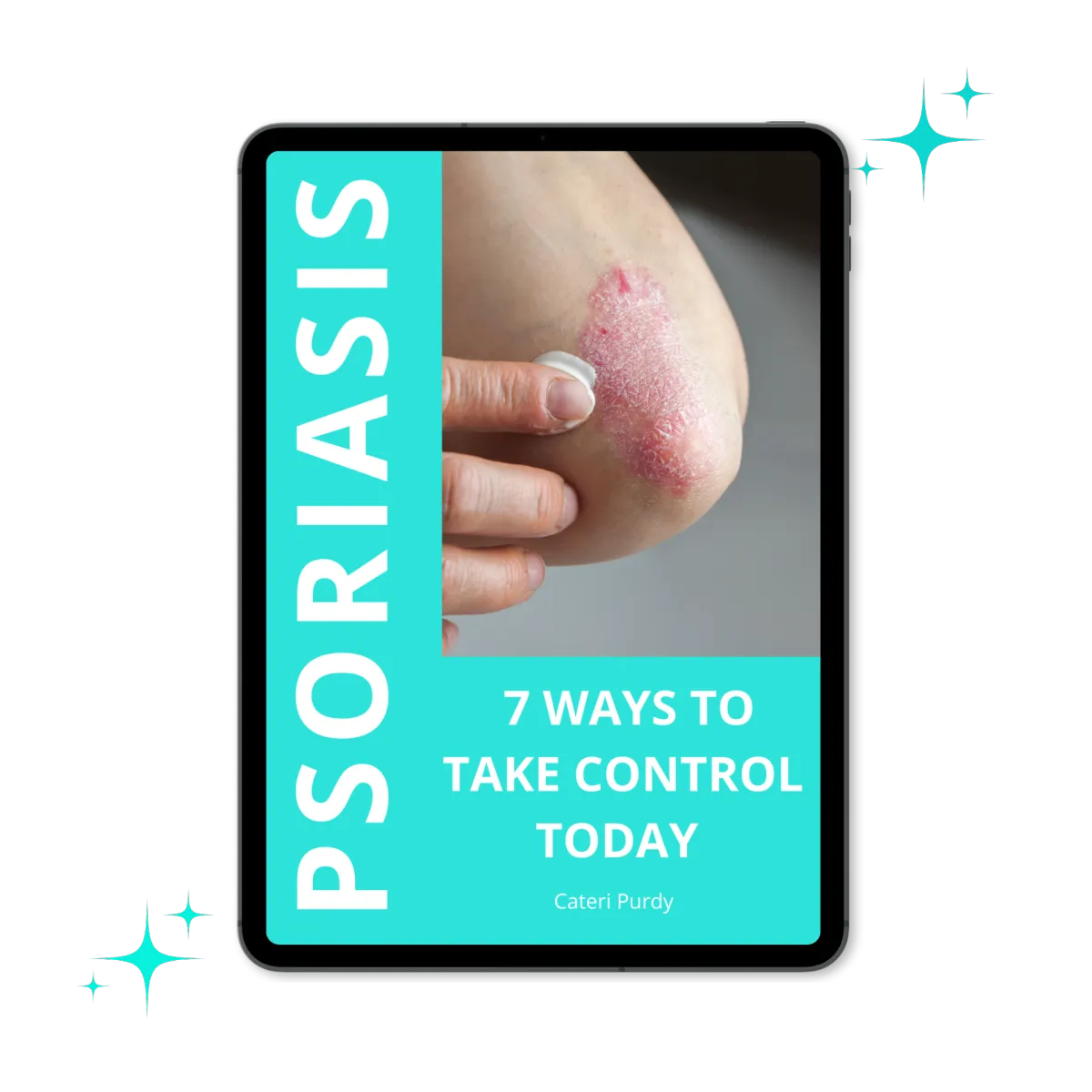What is Psoriasis?
Psoriasis is an inflammatory skin condition, where the skin cells reproduce much faster than normal. Most commonly this results in scaly, itchy, painful plaques forming on the skin, although it can manifest as other types of skin rashes . It can also lead on to psoriatic arthritis which affects the joints, and nail psoriasis where the nail bed can eventually become affected (see my blog "What is Psoriasis? for more information). Having psoriasis also makes us more susceptible to diabetes, heart disease and depression. Well that's great isn't is?
Psoriasis is classed as an autoimmune disease so unfortunately, this means that there is no cure. Once we have one autoimmune disease, it puts us at greater risk for getting another. However, if we can get to the root of what is triggering our psoriasis, and there can be many causes, remission is possible for so many of us. I know as I have managed to get into remission myself.
My mission is to help as many people as I can control their psoriasis, manage their flares and get their lives back.

Hi I'm Cateri
I am a Nutritional Therapist and I've been managing my psoriasis nearly all my life. I understand what you are going through and all the daily challenges you may face.
I have had to deal with the comments, the flaking skin, the MAD itching and how psoriasis can drag you down - to name just a few of the ways in which psoriasis interferes with your daily life. Oh, and I'm sure you can't live without your vacuum cleaner!
When people see your psoriasis, they think it is just a skin rash or you have hurt yourself. You get comments like “What have you done to your arm?”, “Is it contagious?” or even “Eww!! What is that?!” or “What is the elephant skin on your elbow?”. Not helpful is it?
Little do they know it is incredibly itchy, and you scratch it even when you don’t know you’re doing it. You don’t want to wear clothes that show it off, like short sleeves or summer clothes, or too many layers in the winter because that means you can’t get to the plaques too easily when it gets mad itchy. They don’t realise that the excuses you make not stay the night at their house is not because you’re being unsociable – its because the flaking of your skin gets everywhere, and you feel gross about it. They don’t realise you have to check your car before anyone gets in because the flakes have got all over the wheel and the dashboard (never really worked out why that happens!), but it makes you feel bad. You also feel awkward when you say you can't eat something that triggers your flare, and feel you're being fussy. It also doesn't help when they think they can catch it from you. What people also don’t realise is that what you actually have is an inflammatory autoimmune skin disease, which puts you at risk for other diseases such as heart disease and metabolic syndrome - to name just two. That’s great, isn’t it? Not only do we have to live with this miserable disease on a daily basis, but it raises the risk for more fun in the future.
So, what can we do to help ourselves. There are treatments such as steroids and biologics, but they do not suit everyone. I believe these are useful when you are in a massive flare up to get things under control. I also believe you can help yourself with changing your diet and lifestyle to reduce flares and manage your skin in the future. Sadly, we cannot cure our psoriasis and if anyone tells you they can, it is a warning sign. By delving into your health history, changing your diet and lifestyle you can work towards finding out what triggers your flares and manage your skin – and people often get into remission by doing so. Remission means that your skin clears up, but if you allow the triggers back into your life again, it will come back.
The problem is – how do you find out what is causing your flares when there is so much information out there on different diets and lifestyle habits? It all gets very overwhelming doesn't it? Especially as we are all so different and there are many different genes associated with the different types of psoriasis.
Let me help you get through the maze of information so you can find out what triggers your skin and learn how to manage it yourself.
How Can I Help?
One to One Support
The best way to tackle psoriasis is to get to the root cause, and the best way to do that is with a one to one consultation. This is where we can explore what is triggering your flares and make a personalised plan to change your diet and lifestyle so you finally get to manage your skin.


Membership
If you are not ready for a one to one consultation for any reason then my membership may be right for you.
Project Pso is a membership site that gives you plenty of information to help you understand what might be triggering your psoriasis and how to manage it.
Blog
If you would like some general information about how you can manage your psoriasis? Then read my blog here.

What is the Difference Between Psoriatic Arthritis, Rheumatoid Arthritis and Osteoarthritis?
What is the Difference Between Psoriatic Arthritis, Rheumatoid Arthritis and Osteoarthritis?
Psoriatic Arthritis (PsA)
PsA is an inflammatory autoimmune disease of the joints associated with psoriasis of the skin and nails. It is difficult to diagnose as there are currently no available tests for it. PsA also affects the ligaments and tendons where they connect to bone. The ligaments in feet can be affected causing pain in the heel and sole of the foot (plantar fasciitis). It tends to affect the joints nearest the nails on both hands and feet. Some people can have PsA without recognising they have psoriasis, or they can get it before psoriasis appears. Others will have recognisable psoriasis and the PsA will follow a few years on. As with psoriasis there are no rules to go by really. PsA can also affect one side of the body, and both sides too. Women and men are affected equally in number, but men are more likely to get into remission than women.
Rheumatoid Arthritis (RA)
Rheumatoid arthritis is also an inflammatory autoimmune disease where the immune system attacks the synovium cells that cover the joints. The resulting inflammation then damages joint, tendons and ligaments. There are tests to confirm the diagnosis. Rheumatoid factor (a protein produced when the immune system is attacking itself) and anti-citrullinated peptide (antibodies produced by the immune system) are detected in the blood, although some people can have rheumatoid factor and not have RA and the antibodies are not always found in people with RA either. RA generally is affects both sides of the body. It affects the joints in a similar way to PsA, except it causes pain and swelling in the central joints of the fingers and toes. Women are three times more likely to get RA than men.
As you can see there are not really any firm rules to follow with either of these diseases. It is best to see a specialist in this field who will be able to do the right tests and put all the information together to come up with a proper diagnosis. Both diseases are treated in a similar way.
Osteoarthritis
OA is generally considered to be wear and tear of the joints, mostly in weight bearing joints such as the hips, knees, and hands. The protective cartilage at the ends of the bones wears down and is not repaired properly. This leads the bones to rub together causing pain and discomfort. However, recent studies have suggested that the immune system plays a role in OA too. In one small study monocytes, a type of immune cell, were found to be higher in women with OA. In another study mast cells (an immune cell which releases histamine) were found in the joints of both people with and without OA symptoms. However, those mast cells found in the joints of OA patients were shown to have released an enzyme, tryptase, which can destroy cartilage. Women are more likely to have OA than men, and will have more OA in the knees, whereas men get OA more in the hips.
In all three types there is an immune involvement, but different parts of the immune system affect each disease differently. The differences lie in which areas of the immune system are involved and which joints are involved. The treatment for OA can differ from PsA and RA, but all three will involve bringing down inflammation.
Why have I got psoriasis?
There definitely seems to be a genetic element to psoriasis. Most people can trace a family member who has had it or has gone into remission. However, if you do have one of the genes for psoriasis, you may not necessarily go on to get it. This is because a gene is like a loaded gun. It will not harm anyone unless you pull the trigger. There are many triggers for autoimmune diseases but the most common ones are:
Stress
Gut issues
Infections
Inflammation
It is important to understand these concepts:
Psoriasis almost always has a genetic component
You need a trigger - diet and lifestyle
Diet and lifestyle factors will keep the disease going
How can I get rid of it?
Psoriasis cannot be cured, but you can learn to manage your flares and work towards getting into remission, which means you can seem like you're cured but there is still a risk that it may return if the circumstances are right. However, psoriasis can go away unexpectedly. My Dad had a classic case history of psoriasis. He got a very serious throat infection at the age of 16 which triggered the disease. It went on throughout his life until it suddenly disappeared when was in his late 50's. In his late 80's it did return in the form of nail psoriasis. In order to manage your skin you need to find out:
if you have psoriasis in the family
what triggered it initially
what is keeping the disease going
What can I do to manage my flares?
Managing flares involves learning what is causing them in the first place. We are all different so it takes some detective work to find out our individual triggers. The first thing to do is keep a journal of when your skin flared and what happened immediately before then. Some common things to look out for are:
food intolerances
alcohol
lack of sleep
stress
Start looking for patterns of when your skin flares and also when it calms down. For example, my skin flares badly when I eat gluten and potatoes. However, it would always calm down on holiday, so I realised stress reduction and increasing my vitamin D levels (from the sunshine) were key in my flare management.
What can I put on my skin to calm it down?
Some natural alternatives to steroids that you can try on your skin include:
Aloe Vera gel
Apple cider vinegar (I have a great one with honey and turmeric) always dilute water first as it can be too harsh to put directly on the skin
Any lotion with the herb Oregon grape (Mahonia Aquifolium)
Products containing Dead Sea minerals
Personally I have found shea butter really soothing. Mine contains lavender essential oil and I find it is brilliant at softening plaques
These products may help calm down your flares while you work on the root cause or causes, which start on the inside.
© 2023 CATERI PURDY
FREE DOWNLOAD


